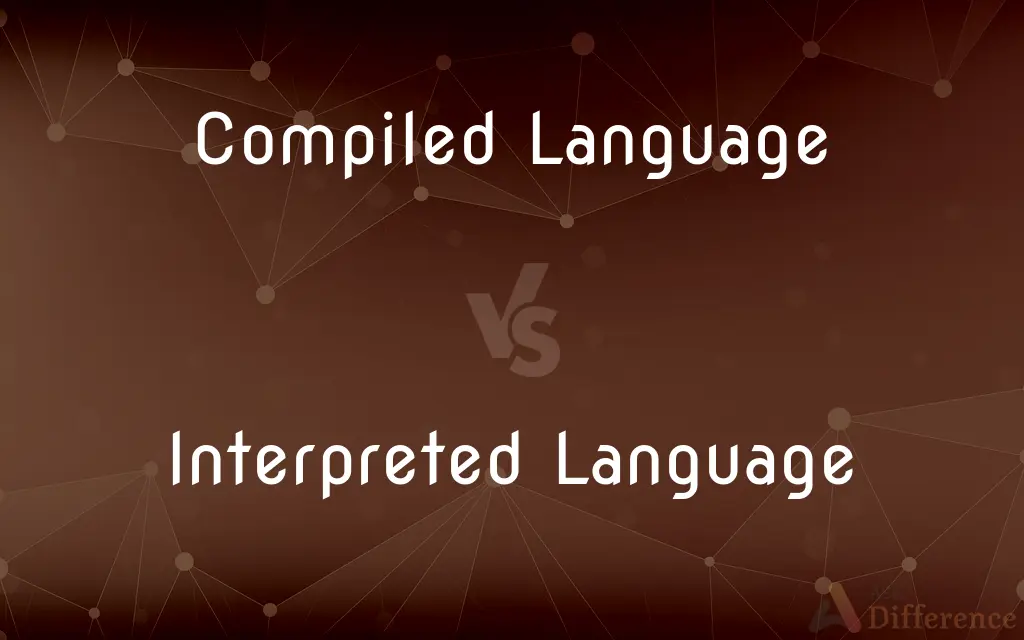Compiled Language vs. Interpreted Language — What's the Difference?
By Tayyaba Rehman — Published on January 9, 2024
Compiled languages are converted into machine code before execution, offering faster performance, while interpreted languages are translated on-the-fly during execution, offering flexibility and ease of debugging.

Difference Between Compiled Language and Interpreted Language
Table of Contents
ADVERTISEMENT
Key Differences
Compiled languages, like C++ and Java, are converted into machine code by a compiler before they are run. Interpreted languages, such as Python and JavaScript, are executed line-by-line by an interpreter at runtime.
Compiled languages typically offer faster execution since the code is directly translated to machine language beforehand. Interpreted languages may run slower but offer more flexibility, as they can be modified while the program is running.
The compilation process in compiled languages involves checking for errors before execution, which can lead to more optimized and error-free code. In interpreted languages, errors are found during execution, which aids in easier debugging.
Compiled languages are often used for applications where performance is critical, like system software. Interpreted languages are preferred for rapid application development and scripts due to their ease of use and flexibility.
In compiled languages, the source code is not needed to run the application once it is compiled. In contrast, interpreted languages require the source code to be present for the interpreter to execute the program.
ADVERTISEMENT
Comparison Chart
Translation Method
Translated to machine code before execution.
Translated on-the-fly during execution.
Execution Speed
Generally faster.
Generally slower.
Error Detection
Errors are detected during compilation.
Errors are detected during runtime.
Use Cases
System software, applications where performance is critical.
Scripting, rapid development, where flexibility is important.
Dependency on Source Code
Not required after compilation.
Required during execution.
Compare with Definitions
Compiled Language
Compiled languages perform error checking before the program runs.
Rust, a compiled language, offers robust error handling and memory safety features.
Interpreted Language
Interpreted languages are typically slower but easier to debug.
Using Ruby, an interpreted language, developers can quickly identify and fix code errors.
Compiled Language
Compiled languages often result in faster-running programs.
Fortran, a compiled language, is used for scientific computing due to its performance.
Interpreted Language
Interpreted languages are often used for scripting and automation tasks.
Bash, an interpreted language, is commonly used for writing shell scripts in UNIX systems.
Compiled Language
A compiled language typically produces a stand-alone executable file.
After compiling the Go source code, a single executable file was generated for deployment.
Interpreted Language
An interpreted language does not produce a separate executable file.
PHP scripts, being interpreted, run directly on the server without prior compilation.
Compiled Language
A compiled language is translated entirely into machine code before execution.
C++ is a compiled language, offering efficient execution for system-level software.
Interpreted Language
An interpreted language is executed line-by-line by an interpreter.
Python, an interpreted language, is popular for its readability and ease of use.
Compiled Language
Compiled languages are processed by a compiler to produce executable code.
Java code is compiled into bytecode, which is then executed by the Java Virtual Machine.
Interpreted Language
Interpreted languages offer flexibility with on-the-fly code execution.
JavaScript, an interpreted language, is extensively used for dynamic web development.
Common Curiosities
Can interpreted languages be used for desktop applications?
Yes, but they are less common compared to compiled languages due to performance factors.
Is Java a compiled or interpreted language?
Java is both compiled (to bytecode) and then interpreted (or JIT compiled) by the JVM.
Can compiled languages be used for web development?
Yes, especially with technologies like WebAssembly and server-side compilation.
Are scripting languages typically interpreted?
Yes, most scripting languages like Python and JavaScript are interpreted.
Is C++ a compiled language?
Yes, C++ is a compiled language known for its performance and efficiency.
Do interpreted languages have slower runtime compared to compiled?
Typically, yes, due to the overhead of line-by-line interpretation.
Are compiled languages platform-dependent?
Yes, compiled languages often produce platform-specific executables.
Are there languages that are both compiled and interpreted?
Yes, some languages like Java and Python can be both compiled and interpreted.
Is Python a compiled or interpreted language?
Python is primarily an interpreted language.
Can compiled languages handle errors during runtime?
They can handle runtime errors, but all syntax errors are caught during compilation.
Can compiled languages be cross-platform?
They can be, but it often requires compiling the code for each target platform.
Do interpreted languages offer better portability?
Yes, since they are not compiled to machine-specific code, they offer better portability.
Do interpreted languages require an interpreter to run?
Yes, an interpreter is necessary to execute interpreted language programs.
Are interpreted languages easier for beginners?
Generally, yes, as they tend to have simpler syntax and more flexible error handling.
Can compiled programs run without the original source code?
Yes, once compiled, the executable can run independently of the source code.
Share Your Discovery

Previous Comparison
Antivirus vs. Internet Security
Next Comparison
Each Other vs. One AnotherAuthor Spotlight
Written by
Tayyaba RehmanTayyaba Rehman is a distinguished writer, currently serving as a primary contributor to askdifference.com. As a researcher in semantics and etymology, Tayyaba's passion for the complexity of languages and their distinctions has found a perfect home on the platform. Tayyaba delves into the intricacies of language, distinguishing between commonly confused words and phrases, thereby providing clarity for readers worldwide.














































